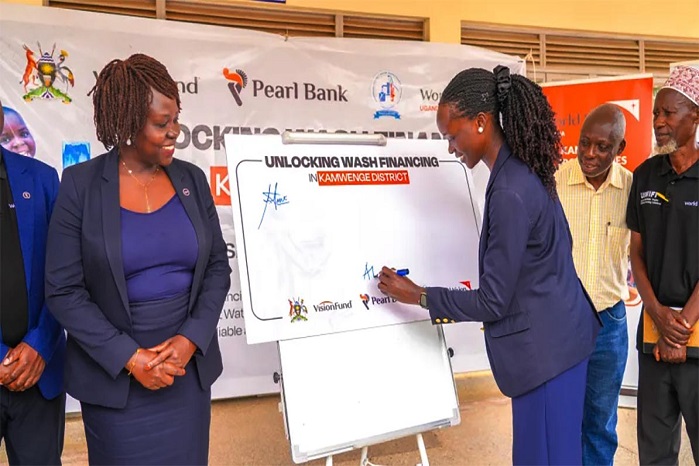
Officials from the ministry of finance, planning and economic Development during the National Competitiveness Forum held at Mistil Hotel Nsambya on Thurdsay. In the middle is Matia Kasaija, the minister for finance
A cross section of officials from the ministries of finance, STI and Government MDAs pause for a photo during the Competitiveness Forum
HABARI DAILY I Kampala, Uganda I The Uganda Government has made strides in establishing a knowledge economy, by investing up to sh17 billion.
The knowledge economy, which refers to the ability to capitalize on scientific discoveries and applied research, can be attained through allocating heavy investment in science, technology and innovation (STI).
Moving into this direction, the Government has established the National Science, Technology, Engineering, and Innovation Skills Enhancement Project (NSTEI-SEP).
This project is designed to boost skills in startups and technology development at the Namanve and Rwebite Centers.
According to Matia Kasaija, the minister for finance, planning and economic development, the technology sector contributing over 2.5% to Uganda’s GDP in 2023, and projections indicating annual growth of 8%.
“The Government has already seen remarkable contributions from STI, leading to creation of over 50,000 direct and indirect jobs by startups under this segment,” he said, adding that this has fueled development and created countless opportunities for Ugandans.
He made this reveration during the 15th National Competitive Forum, which was held at Mestil Hotel in Kampala recently.
Kasaija pointed out that key investments in STI include vaccine development under the pathogen economy, where laboratories at institutions such as Makerere University and Gulu University have been equipped with state-of-the-art facilities.
He added that these efforts have led to the development of three COVID-19 vaccine candidate prototypes.
“These were developed by the Uganda Virus Research Institute (UVRI) and College of Veterinary Animal Resources and Biosecurity (COVAB),” he said.

Ramathan Ggoobi, the permanet secretary, ministry of finance chatting with Dr Monica Musenero, the STI minister during the Competitiveness Forum
He added that sh25 billion has been allocated to private entities in pharmaceuticals to advance anti-tick vaccine development under the pathogen economy.
Kasaija further said that Shs75 billion will support the clinical trials and establishment of an internationally certified production facility for COVIDEX medicines, adding that there are also further advancements in the mobility sector which highlight Uganda’s potential to lead in e-mobility.
These include the Kayoola EVS electric bus and the multi-functional tricycle for mobility, irrigation, and power generation.
He added that sh75b has been allocated to private sector players to boost productivity in high-value processing, complete and expand modern coffee production facilities, and enhance market penetration both locally and internationally.
This investment, he pointed out, aims to strengthen Uganda’s coffee industry, a key export for the country, by increasing competitiveness in regional and global markets.
Ramathan Ggoobi, the permanent secretary, ministry of finance said that Uganda has installed a total of 4,354 Km of optic fiber cable across the country connecting 1,523 key Government service delivery units to the National Backbone Infrastructure.
“This has led to increased internet penetration in the country to 64% from 25% in 2017, and the share of Government services provided online is now at 40%, up from 20% registered in 2017.”
He noted that going forward, Wi-Fi will be further rolled-out to an additional 820 key locations at subsidised rates, focusing on essential services such as schools, hospitals, and markets in selected sub-regions.
The Government, he added, will additionally upgrade the national backbone infrastructure to enhance connectivity across the Greater Kampala Metropolitan Area.




